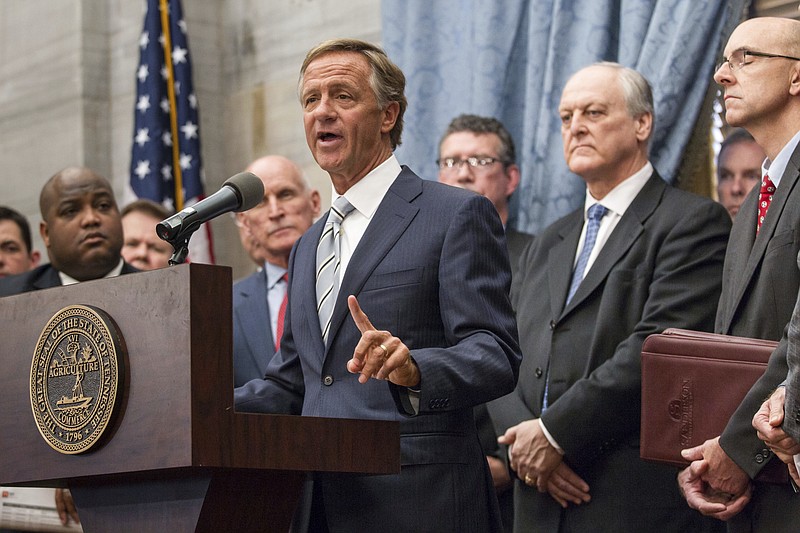NASHVILLE, Tenn. (AP) - Republican Gov. Bill Haslam on Wednesday proposed Tennessee's first gas tax hike in 27 years to fund an ambitious roadbuilding program that would carry through well after he leaves office in two years.
Haslam's plan would generate about $278 million per year in new transportation funding, while at the same time cutting about $270 million in taxes for shoppers buying groceries, manufacturing companies investing in the state and people earning income from stocks and bonds.
The governor also wants to index further gas tax increases to inflation, though he acknowledged that might be the most challenging aspect of his plan for lawmakers to accept. But Haslam argued that the state's $6 billion backlog in transportation projects should spur legislators into action.
"Hard stuff is hard to do," the governor said. "I recognize that this is not an easy thing to do. But I think people understand that we have to do something."
Haslam cautioned that if lawmakers tweak the plan to include a lower tax rate or to remove the indexing element, it will just take longer to get road projects underway.
"There's no pixie dust here: It's all dollars in, dollars out," Haslam said. "And that's the conversation we want to have."
Other elements of Haslam's plan include:
- Raising the tax on diesel by 12 cents to bring it into line with the gas tax.
- Adding a 3 percent charge on cars rented in Tennessee.
- Collecting $18 million for road projects by bringing the state's open alcohol container law into federal compliance. Most of that money is now earmarked for drunken-driving enforcement and prevention.
- Increasing car registration fees by $5 for the average passenger vehicle.
- Charging electric vehicles $100 per year to drive on Tennessee roads and charging higher taxes for vehicles running on natural gas.
- Giving cities the authority to hold referendums on whether to increase local sales tax rates to pay for mass transit projects.
The local option is likely geared toward getting urban Democrats on board with the plan, which could be crucial to the measure passing in both chambers. Many of the majority Republicans are uneasy about voting for any tax increase, even if it is balanced with cuts to taxes in other areas.
The Republican speakers of the state House and Senate made positive statements about Haslam's plan, but neither Rep. Beth Harwell of Nashville nor Sen. Randy McNally of Oak Ridge went so far as to outright endorse the proposal.
Harwell, who has not ruled out a gubernatorial bid to succeed Haslam next year, said in a statement that she is grateful the governor has found a way to cut taxes while also calling attention to the state's infrastructure needs.
McNally said the governor's plan "attacks the funding issue in a responsible way." Both said they are looking forward to a robust debate.
Andrew Ogles, the leader of the Tennessee chapter of Americans for Prosperity, is an early opponent of Haslam's proposal, saying he would offer his own plan to boost transportation funding by $2 billion over the next decade without the need to raise any taxes.
Ogles argued that Tennessee shouldn't be raising taxes when the state has a large surplus and growing revenues.
"That money belongs to the taxpayers, and it's time that we invest existing revenue in the taxpayers and not looking for new ways, quite frankly, to steal from taxpayers," he said. "There's a point when revenue surplus when it becomes theft. And we've reached that point."
Haslam rejected calls to tap into the state's surplus funds to pay for his transportation program, arguing that doing so would dedicate taxes paid only by Tennesseans to roads that also are used by out-of-state cars and trucks.
A recent study by state Comptroller Justin Wilson found that Tennessee's fuel tax collections have remained essentially flat since 2000 amid improving fuel efficiency, decreasing miles driven and mounting roadbuilding costs.
The purchasing power of the state's gas tax collections has fallen by about half since the last time the tax was increased in 1989, according to the report.
